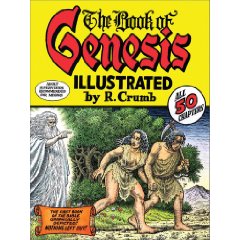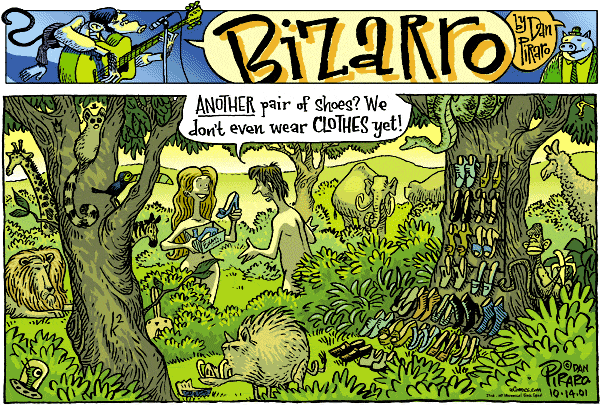My previous post generated a series of hearty responses from Alan Lenzi (whom I am sorry to see will no longer be blogging). He has a number of good points which I do not have the time or desire to address individually, it has been a very busy week with another one starting tomorrow, but I followed up by asking him simply, “Do you consider “myth” as in some fundamental sense untrue?” His response was as follows.
Myth is paradigmatically true for those who have accepted it. It is both the model of some aspect of their communal flourishing and a model for its future perpetuation. And therein lies the dynamic.
(I added the emphasis.)
This is why although I certainly accept the term “myth” as a suitable literary description of Gen. 1-3 I do not use the term since, as Alan has affirmed, most understand that term is meaning that the text is fundamentally untrue. Saying that it is true “for those who have accepted it” while also rejecting explicitly or implicitly the truth that the text is conveying is simply condescending.
As I have said in my earlier posts I do believe that Genesis 1-3 are true on many, many levels. In so doing I realize that Alan and others may think that I have “unduly privileged the Bible,” which would be true if I were claiming to treat the Bible and Enuma Elish as the same. But I am not. So I do not use the term myth, not because I am mollycoddling my audience where I should be educating them, but because as defined I do not think the term applies.
Finally, Alan tried to make a comparison of the use of the term “myth” with that of “theology.”
Consider your use of “theology” with regard to rabbinic texts. It would be suspicious if you called rabbinic ideas about the deity “superstition” and reserved “theology” for only Christian texts. Rabbinic notions of the divine are theology for you, even if you don’t believe it all, because that is the label you use to mark out certain notions. And by doing so, you implicitly align your findings with and thereby participate in a broad, inter-cultural conversation about human thoughts through history of super-human entities. Likewise when I talk about the theology of enuma elish or whatever. If we reserved “theology” for only Christian theology (i.e., “true theology”), then we have failed as scholars to deal even-handedly with the data.
The fundamental difference here is that “theology” is a descriptive term, whereas “myth” has become freighted with judgment about the narrative under consideration. Theology is “the study of the nature of God and religious belief.” [mfn]New Oxford American Dictionary[/mfn] So we can talk about the study of any “theology” and that is a very different thing than “doing” theology. When we employ the term myth we are immediately placing upon the texts in consideration certain value judgments.
PS – Chris Heard of Higgaion recently suggested “cosmogeny” instead of myth. I think that could work. Any other suggestions?





4 thoughts on “More on myth”
I commented but I guess it didn’t make it through. ??
Alan – I didn’t see any comment come through or get caught in spam. I will double check. Nope. I do not see anything. If it is not too much trouble, by all means repost!
I have no idea why Alan’s comments did not go through, if you have had the same problem please let me know! Below are Alan Lenzi’s comments (beginning with a quote from the above):
“I certainly accept the term “myth” as a suitable literary description of Gen. 1-3”
Great, I’m happy we agree! 🙂
“Saying that it is true “for those who have accepted it” while also rejecting explicitly or implicitly the truth that the text is conveying is simply condescending.”
I agree that sometimes researchers are
condescending to whatever it is they are studying. But the descriptive
use of the term myth need not be so.
Rather than condescension, I see the process of investigation mutually
enlightening. Outsiders who do not accept the truth claims of a
particular group’s myths can give really useful insights or a fresh
perspective into those myths. The insiders who accept these myths as
paradigmatic truth may learn something about their own myths or how
people perceive them. On the other hand, outsiders, in examining others’
myths that the outsiders do not believe as truth, can often train the
insights they’ve gained from such myths onto their own “paradigmatic
truths” (myths) and learn something about themselves. There is a
reciprocal relationship between studying others to learn about others
and studying others to learn about oneself. Isn’t that what the
Humanities and a Liberal Arts education is at least partly about? By
denying the general use of a descriptive categorical term that seems so
self-evidently applicable, you reify a certain division between your
truth (non-myth) and everyone else’s nonsense (myth). Why can’t your
myths be true for you but not for me but still be myths?
I have a class where we begin by looking at Mesopotamian myths to see
how myths function in a society and then we read Richard Hughes’
Myths America Lives By to examine our own myths and ask the same
kinds of questions we asked about Mesopotamian society. It’s very
effective to get people to think about our own political myths.
By the way, the exception you take to my analogy from the term
“theology” only proved my point. “Theology” in many circles is loaded,
as in a load of crap. Pure speculation. Baseless imaginings. So there’s
a subjective connotation that must be addressed when using the term.
Furthermore, the definition you gave indicates that polytheistic
“theology” isn’t really theology. So you’re use of the term is hegemonic
(prescriptive) and freighted with a certain ontological presupposition.
If it’s going to be cross-culturally useful, the definition will have to
be broadened. Your theology can be true to you whereas it may not be so
for me. But we might both agree that it is still theology.
I’ll let you have the last word.